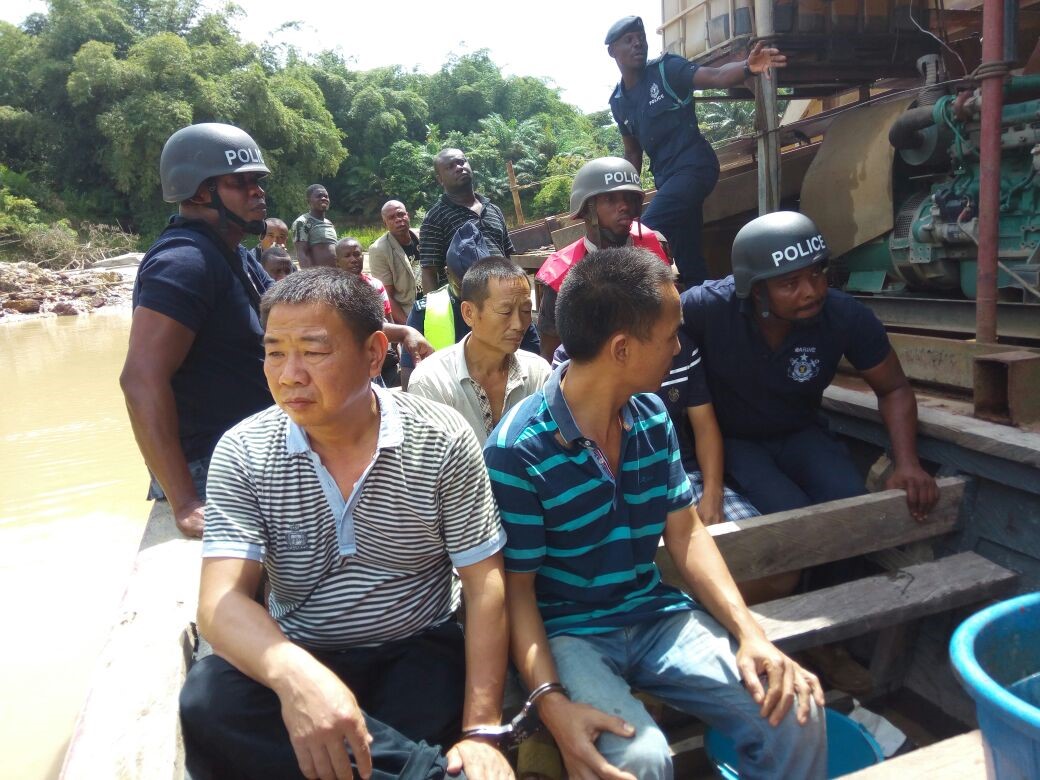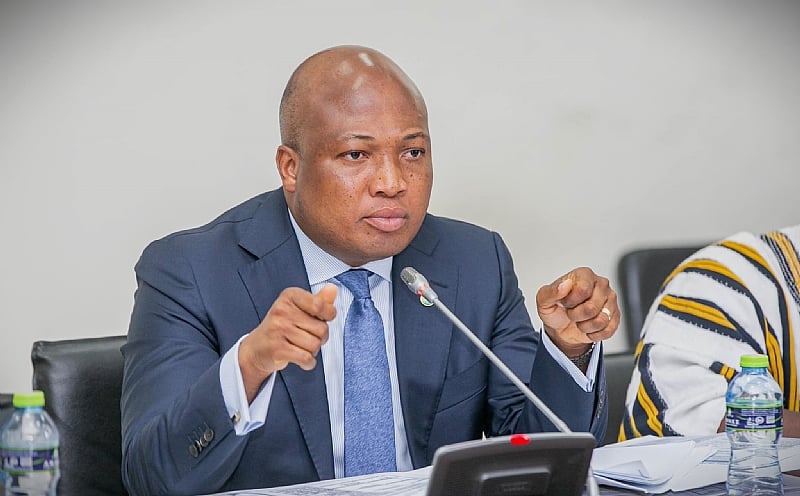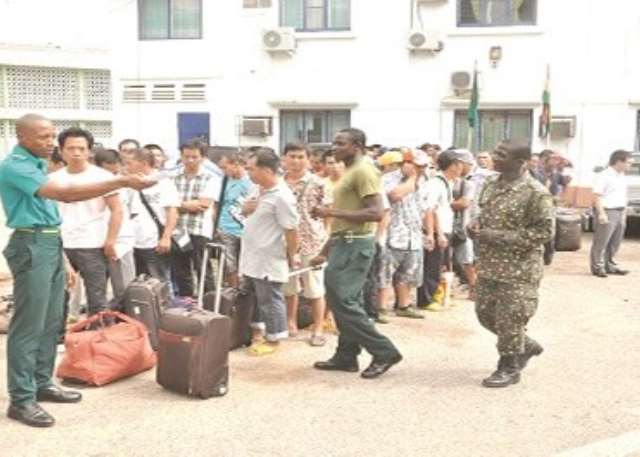Minister for Foreign Affairs, Samuel Okudzeto Ablakwa, has announced reforms to visa processing procedures for Chinese nationals, as part of a renewed effort to tackle illegal mining commonly known as galamsey.
Speaking at the Government Accountability Series on Monday, 15th September, the Minister reiterated Ghana’s strong and longstanding relations with China but made clear that illegal activities perpetrated by certain individuals cannot be tolerated.
“We have very great relations with China and, to be fair to the Chinese, a lot of them are doing good business, they are investing in transformative projects,” Mr Ablakwa said.
“There is no official Chinese government policy to come and destroy our environment.”
However, he acknowledged that a small but persistent number of Chinese nationals have been involved in illegal mining operations in Ghana an issue that has become a national concern.
As part of his recent official visit to China, Mr Ablakwa travelled to a province “notorious” for sending nationals to Ghana to engage in galamsey.
In a high-level meeting held in Nanning, Guangxi province, the Minister said he delivered a firm message on behalf of President John Mahama.
“I did not mince words at all,” he said. “I really stated President Mahama’s position that this cannot continue.”
Mr Ablakwa revealed that Ghana’s embassy in Beijing and consulate in Guangzhou have introduced strict new visa protocols.
With immediate effect, group visa applications from Chinese nationals are no longer being accepted.
“That’s the new policy. Everybody must show up for an interview… if you are coming for a conference, an excursion whatever you must all produce yourselves individually and apply individually,” he declared.
“There is a strict directive: no more group processing of visas,” the Minister added, noting that this decision was one of the outcomes of the meeting held in Guangxi.
He noted that this forms part of a broader government clampdown on illegal mining.
“I can assure you that we are dealing with this matter very fairly, in our national interest,” said Mr Ablakwa. “Because this galamsey menace is really a menace that all of us must confront.”
The Chinese Exploitation in the mining sector
The exploitation of natural resources has always existed in Ghana but the environmental degradation or detriment to the formal economy has been limited by the scale and techniques of the local people until the emergence of Chinese nationals over the past decades with their sophisticated equipment and which has escalated the situation.
Economic liberalization in China and the greater opportunities for international travel and work available to Chinese citizens have been contributing to a host of Chinese migrant workers flocking to Africa to make their fortunes in a range of industries and Ghana is no exception.
The 2016 ‘Afrobarometer’ survey on the perception of China in Africa, revealed that the perception of China as a resource extractor is highly dominant in Ghana than in any other African country.
Overall, it is estimated that some 50,000 individuals from China have made the journey to Ghana over the past fifteen years. These Chinese migrants brought their expertise and techniques to Ghana, radically disrupting the available natural resources they come across.
Apart from taking advantage of the uneven legal enforcement in Ghana, these Chinese nationals are on record to be paying bribes to local Chiefs who are custodians of these natural resources, and some political heads and the footprints of their destructions are there for all to see.
With ample gold reserves, the mining sector was – and is - of particular interest to these Chinses nationals and Ghana is currently sweating over illegal mining.
The phenomenon of illegal artisanal mining - known as galamsey, derived from the phrase “gather them and sell” - in Ghana demonstrates the collective impact of individual Chinese migrants.
Such are the concerns about Chinese miners in Ghana that former President Nana Akufo-Addo spoke to Nikkei Asian Review in January 2019, stating that “Ghana and China have a strong relationship; however, we have a big problem [with] Chinese involvement in illegal mining activity in Ghana […and] we have decided to do something about it.”
Interestingly, a study by Crawford et al. in 2015 revealed that almost all the Chinese nationals involved in galamsey in Ghana stem from just one county in the Guangxi autonomous region (home to the Zhuang people), in southern China. Dubbed the ‘Shanglin Gang’ after the eponymous county with a long history of gold mining, these Chinese migrants brought their expertise and mining techniques to Ghana, radically disrupting the local mining scene.
Ghana is Africa’s largest (and the world’s 6th-largest) gold exporter in 2021. Such is the scale of this problem that, estimates of the amount of gold leaving the country for China outstrips government revenue from mining, with $2.3 billion worth of gold exiting the country in 2016. Concerns about Chinese miners illegally exporting gold to the UAE have also emerged, with Akufo-Addo noting that there was a $5 billion discrepancy between trade statistics and actual gold exports in 2017.
As China is gaining as a result of illegal mining activities, Ghana continues to lose several hectares of fertile forestlands across the country, especially within the last decade. The Tano Nimiri, Tano-Offin, Numiri, Kobro, Oda, Jimira, and Atewa forests, including many others in the Ahafo, Western, Ashanti, and Eastern regions have all suffered from the illegality.
In 1901, Ghana’s total forest reserve cover stood at 8.2 million hectares but is now estimated to be less than 1.6 million hectares according to the Forestry Commission. The rate of deforestation based on the trend has been pegged at an unsustainably high rate of 65,000 hectares per annum.
Between 2015 and 2018, galamsey-driven deforestation increased from 13,456 hectares to 29,275 hectares. As of 2018, the total extent of forest degradation in protected forest reserves affected by galamsey was about 1058 ha. This is according to data from the Centre for Remote Sensing and Geographic Information Services (CERSGIS).
Given the prevailing rate of deforestation, it is estimated that there will be no natural forest in Ghana by the year 2035.

Some Chinese arrested by the police for indulging in galamsey
Many rivers, including the Birim River in the Eastern Region and other water bodies, that take their source from these forests have as a result been left heavily polluted depriving residents in nearby communities of a source of fresh water and putting at risk the lives of over five million other people in major cities in the south whose potable water are sourced from the forests.
The case of impunity
Many of these Chinese nationals engaged in illegal activities have been arrested in the country but their prosecution has been a matter of concern for all Ghanaians.
The most infamous case that outraged the nation involved a Chinese woman who was described as the “galamsey queen”. En Huang, for that, was her name, was arrested on May 9, 2017, together with her gang of four other Chinese nationals but later left off the hook. She is currently serving her four-year sentence after she was arrested again in 2023 for illegal mining.
On June 24, 2021, The Fourth Estate wrote to the Ghana Prisons Service through the right to information (RTI) requesting data including the number of foreign inmates in the country’s prisons.
The service responded in a letter dated July 29, 2021. From the data, The Fourth Estate found that there were only two Chinese convicts in the country’s prisons as at July 2021.
When The Fourth Estate followed up, the Prison Service later declined to provide the crimes that got the two incarcerated. The two Chinese in Ghana’s prisons is in spite of the hundreds of Chinese illegal miners arrested from 2013 to 2020.
According to data compiled by the Ghana Immigration Service (GIS), a total of 1,641 Chinese nationals involved in illegal mining in Ghana were arrested and repatriated between 2009 and August 2022, which shows that 1,018 were repatriated between 2009 and 2016, and between 2017 and August 2022, 623 Chinese involved in illegal mining have been repatriated.
The deportation of Chinese nationals involved in galamsey by the Mahama administration
Since the NDC government took office, over 100 foreign nationals, including Chinese citizens, have been deported for engaging in illegal mining (commonly known as galamsey) and related offences.
The Interior Ministry has stressed that the deportation policy is not intended to favour foreigners or show leniency. Instead, it is designed to prevent further abuse of Ghana’s legal system and to safeguard national interests.
“You arrest about 80 Chinese, and you have to find a place to keep them, and then sometimes even vehicles to take them to court are a problem. You go to court and they succeed in getting bail," Deputy Interior Minister Ebenezer Terlarbi argued on JoyNews’ PM Express.
Mr Terlarbi further explained that the sheer logistical, legal, and financial burden of keeping foreign galamsey suspects in Ghana’s already overstretched prison system has forced the government to consider what he called a “more innovative” path.
“We are looking at 1,400 inmates we have now, and feeding them is even a problem. So if there’s a way not to exacerbate the situation by sending them back to their home countries, I think that I would opt for that.”
but, civil society organization Democracy Hub has initiated legal action against the government, challenging its controversial policy of deporting foreign nationals arrested for illegal mining (galamsey) without prosecution.
Democracy Hub's writ of summons, filed at the High Court in Accra, contends that the government's deportation practice violates Section 99 of the Minerals and Mining Act, 2006 (Act 703), which requires prosecution for illegal mining offenses.
The group also argues that the policy breaches constitutional guarantees of equality before the law (Article 17) and the right to a fair trial (Article 19(2)).
At the heart of the lawsuit are several critical allegations. Democracy Hub asserts the government has unlawfully substituted criminal prosecution with deportation for offenses under Act 703, despite the law prescribing mandatory jail terms of 15 to 25 years for illegal mining.
The group indicated in its writ that "the selective decision not to prosecute foreign nationals, while prosecuting Ghanaians for the same offences, constitutes unequal treatment before the law," and "Deportation, in the absence of conviction, does not satisfy the objectives of deterrence and may embolden perpetrators."

Minister for Foreign Affairs, Samuel Okudzeto Ablakwa
The organisation further highlighted what it calls a discriminatory two-tier justice system where Ghanaians face prosecution while foreign nationals are simply deported.
The group has challenged the government's justification that deportees face prosecution in their home countries, calling these claims "speculative and unsubstantiated."
Democracy Hub is demanding full disclosure of any diplomatic communications or reports that might verify such foreign prosecutions.
The lawsuit seeks multiple remedies from the court, including declarations that the deportation policy is unlawful, orders to cease deportations without prosecution, and the disclosure of all documents related to deported individuals.
The organisation is also seeking costs of GHs300,000 for legal expenses.
Citation:
Jeremy Luedi: Galamsey in Ghana and China’s illegal gold rush.
The Environmental Investigation Agency (EIA): “Rosewood Revealed” EIA Offers Transparency to Ghanaian Rosewood Trade”.
HAGAN SIBIRI: The Dilemma of Chinese Gold Miners in Ghana, 2020
The Fourth Estate: Only two Chinese citizens in Ghana’s prisons despite hundreds arrested for illegal mining. By Seth Bokpe. 2022
Environmental Justice Foundation: Ghana losing millions of dollars as Chinese fishing trawlers hide ownership. 2021
International Centre for Investigative Reporting: How illegal mining is wiping out Ghana’s forests. 2019
Crawford et al. 2015
myjoyonline.com
 Some Chinese arrested by the police for indulging in galamsey
Some Chinese arrested by the police for indulging in galamsey
 Minister for Foreign Affairs, Samuel Okudzeto Ablakwa
Minister for Foreign Affairs, Samuel Okudzeto Ablakwa


 Some Chinese nationals facing deportation from Ghana
Some Chinese nationals facing deportation from Ghana
